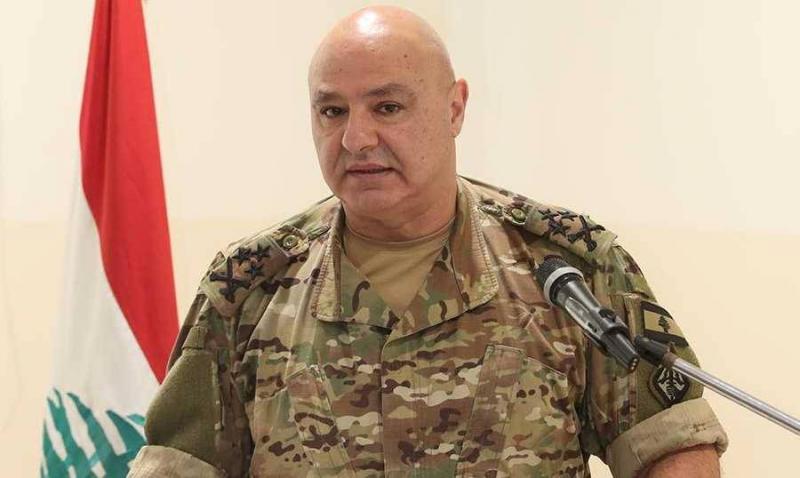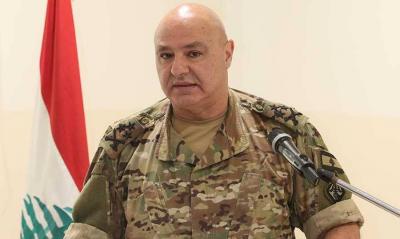France is striving to mitigate the negative reactions resulting from its alignment with Israel in its war against Hamas in the Gaza Strip. This is exemplified by the dispatch of French Minister of Defense Sebastien Lecornu to Beirut, in an attempt, as a ministerial source told "Asharq Al-Awsat," to realign the French position to reaffirm that Paris currently occupies a neutral stance without changing its position in rejecting harm to civilians and emphasizing the importance of rationality, wisdom, and realism among all parties in the south to prevent the situation from escalating and deteriorating, with tension potentially moving from Gaza to the northern front.
The French minister's visit to Lebanon was not limited to inspecting the French unit operating in UNIFIL in southern Lebanon. Rather, it represents a belated effort to correct the French position articulated by President Emmanuel Macron during his visit to Israel, which was echoed by Foreign Minister Catherine Colonna in her meetings in Beirut with Speaker of Parliament Nabih Berri, caretaker Prime Minister Najib Mikati, her Lebanese counterpart Abdullah Bou Habib, and Army Commander Joseph Aoun. She warned against Lebanon's involvement in the ongoing war in Gaza, as this would mean no Lebanese area would remain safe.
The ministerial source points out that Colonna did not need to convey a threatening message to Lebanon on behalf of the United States. The atmosphere during her meetings was uncomfortable, especially since the French ambassador to Lebanon, Herve Magro, represented her in communicating French threats to various political leaders and MPs who were not included in Colonna's meetings.
Lecornu informed those he met that Paris stands in the middle and is not biased in favor of Israel. He emphasized efforts to neutralize Lebanon by preventing the war between Hamas and Israel from extending to the northern front. He confirmed the importance of establishing calm along the blue line and enhancing the missions of the international force tasked with supporting the Lebanese army in implementing Resolution 1701.
Notably, Lecornu's visit coincided with a shift in Paris's position regarding the ongoing conflict between Hamas and Israel, which has resulted in their vote at the United Nations supporting calls for a ceasefire, ensuring the delivery of international aid to alleviate the suffering of Palestinians, and urging the Security Council to bear its responsibility in this regard.
The new yet familiar aspect of the French position is that Paris has decided to send urgent aid to the army, including medical supplies and medicines, while Lecornu stressed the need for a final solution to the Palestinian issue based on a commitment to the two-state solution allowing Palestinians to establish their independent state.
He elaborated on the crucial role of the army, particularly as Lebanon faces exceptional and urgent circumstances, and stressed the need to avoid a vacuum in the military institution and the necessity of preventing vacancy by retiring General Aoun. In this context, it is rumored that Paris favors extending Aoun's term as long as there are political forces opposing the appointment of his successor in the absence of a president.
The French position resonates with the American stance in seeking to extend Aoun's term, a task undertaken by the U.S. ambassador to Lebanon, Dorothy Shea, who is occasionally represented by some of her aides in meetings with various parliamentary blocs, as one source mentioned to "Asharq Al-Awsat." The extension is at the forefront of their discussions to prevent a vacuum in the army's leadership, particularly since the deadlock in electing a president persists, leaving little hope that this election is imminent.
In addition to the French and American positions calling for Aoun's extension, several European and Arab countries have joined in this call, including Qatar, which has publicly advocated for keeping him in military service after he proved his competencies in managing military affairs and keeping it away from political rivalries.
The question remains: Is it possible to extend General Aoun's term, and would this apply to other security and military leaders? What actions are required to soften the stance of the leader of the Free Patriotic Movement, MP Gebran Bassil, who is engaged in settling scores and leads the call against his extension, before being joined by former MP Sleiman Frangieh, who sees it as a means to remove Aoun from the list of presidential candidates?
Frangieh's alignment with his staunch rival Bassil was not random, as some claim he anticipated announcing his stance after consulting with Hezbollah, which was instrumental in giving Bassil the green light to conduct his consultative tour with parliamentary blocs that did not achieve its intended goals, except to break the ice and end the rift with Bassil, albeit from a position of differing approaches regarding presidential elections, given he is not inclined to support him.
However, Bassil's inclusion of Maronite Patriarch Bechara Al-Rahi in his consultative tour opened the door for Al-Rahi to break his silence by announcing his support for extending Aoun's term; otherwise, he would not have needed to say: it is shameful to speak of dismissing the army commander at the most critical stage of Lebanon's existence.
With this position, Al-Rahi preemptively set the stage for receiving the army commander, which, from the perspective of parliamentary sources, implies he raised the issue of extension with Bassil. This is expected to significantly shift the dynamics in favor of extending Aoun's term, necessitating a parliamentary session to consider various proposed laws aimed at keeping General Aoun in military service.
Therefore, Al-Rahi's support for extending Aoun's term is likely to prompt a reshuffling of the cards, possibly within the Free Patriotic Movement, in light of discussions of alternative approvals. However, this is contingent on whether it is agreed not to place the proposed law as a sole and primary item on the legislative agenda, linking it with several other bills and proposals. This situation has led the Speaker of the Parliament to oppose the proposed law submitted by the MPs of the "Strong Republic" bloc, who demanded it be listed as a singular item, which undermines the speaker's authority since it is solely his prerogative, in collaboration with his bureau, to set the agenda for sessions, and no party should impose conditions upon him.




